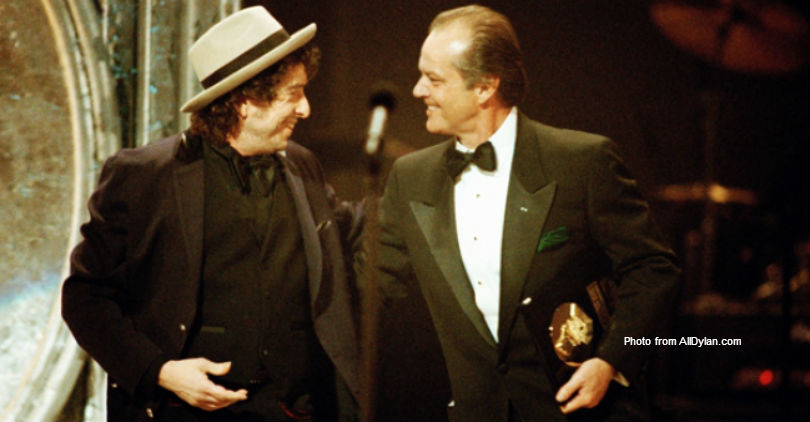Bob Dylan turns 74 today.
On February 20, 1991, Dylan was handed a Grammy “Lifetime Achievement Award” by Jack Nicholson. (Will they grant him a second one soon? The man is still working, after all.) Dylan in 1991 was beginning to receive the oldies act treatment and he did not appear to enjoy this fact even a little bit. Since 1991: nine albums, a hundred or more live performances every year on what critics decided to call his “Neverending Tour,” a dozen releases from his bootleg series. And his paintings and twisted-iron sculpture series, which he debuted two years ago.
Back to February 1991. The First Gulf War was underway that month, and there was no threat of protest or off-message anti-war messages from the show business crowd attending the Grammy Awards in New York City that night. That war was going quite smoothly from America’s perspective, if you will recall. Protesting war was an old thing that old people used to do. So Dylan and his band did the annoying thing and played a violent version of his protest song “Masters of War,” loudly making the point that protest does not play with popularity.
Of course, the hard rock performance was led by his unpunctuated singing—one might wish that he had enunciated the lyrics, but Bob Dylan does not do the obvious even when he does the obvious—and then he accepted the lifetime achievement plaque. I remember that my friends and I could not identify the song while we watched the Grammys, but that we picked up on the idea that he was protesting, well, something. The performance was (is!) genuinely ferocious. Commentary the next day ridiculed an old man who seemed to have lost his way.
The Lifetime Achievement Award actually looks cheap, like something some co-workers who do not like their manager would chip in and buy for his retirement. It looks like something the Grammy people bought at a Kinko’s, and his reaction to it betrayed that he may have been thinking the same thing: He looks at it, adjusts his hat, drops the thing to his side, looks at it again.
He then delivered this brief speech:
“Well, my daddy, he didn’t leave me much, you know he was a very simple man, but what he did tell me was this, he did say, son, he said …” (There was a long pause, nervous laughter from the crowd.) “He said so many things, you know?” (Laughter.) “He say, you know it’s possible to become so defiled in this world that your own father and mother will abandon you and if that happens, God will always believe in your ability to mend your ways.”
And then he was off.
It took him less than a minute, even with his nervous hat fumbling and pauses, but Dylan had just delivered an Old Testament sermon (Psalm 27:10) about the disfigurement of a life spent enslaved to the material things to the bejeweled, genial, war-applauding, music millionaire crowd.
Here is the speech:
There is a rich history of commentary in Jewish tradition. There is also a rich history of commentary in interpreting Bob Dylan’s every public utterance. Psalm 27 begins (in the King James Version): “The LORD is my light and my salvation; whom shall I fear?” In King James, verse 10 reads, “When my father and my mother forsake me, then the LORD will take me up.”
Where does “defiled” come from? “Mend your ways?” A couple Dylan interpreters suggest that his language is straight out of the works of one the founders of Orthodox Judaism in the 19th Century, Rabbi Samson Raphael Hirsch. Hirsch’s commentary on the psalm verse reads: “Even if I were so depraved that my own mother and father would abandon me to my own devices, God would still gather me up and believe in my ability to mend my ways” (Yaffe, Bob Dylan: Like a Complete Unknown, Yale UP). As David Yaffe, the author of the Hirsch discovery points out, Dylan in the late-’80s and early 1990s was a frequent performer on the annual Los Angeles-area Chabad telethons that usually offered entertainment from great (and far older) performers like Norm Crosby, Jan Murray, and Sid Caesar. Perhaps he was reading a lot of scriptural commentary; Rabbi Hirsch is not an obscure figure in that field.
Who better to receive a scriptural pronouncement such as this than a bejeweled, genial, war-applauding Hollywood audience? I am no Talmudic scholar, nor am I a Bob Dylan interpreter, but this is one of the many reasons I enjoy Bob Dylan’s every appearance.
Someone has placed on YouTube a complete video that includes a CBS News war update from the era, Jack Nicholson’s introduction, the bizarrely sung but musically amazing performance of “Masters of War” (check your volume settings, YouTube seems to be set loud for this video), and the speech:
* * * *
This first appeared in shorter form a year ago.
* * * *
Follow The Gad About Town on Facebook! Subscribe today for daily facts (well, trivia) about literature and history, plus links to other writers on Facebook.
Follow The Gad About Town on Instagram!

____________________________________________
The WordPress Daily Prompt for May 24 asks, “Put together a a musical playlist of songs that describe your life, including what you hope your future entails. “

The two people who could probably not give a crap less what people think of them: Nicholson and Dylan. Gotta love it.
LikeLiked by 1 person
Two broken molds right there.
LikeLike
Isn’t that the truth!
LikeLiked by 1 person